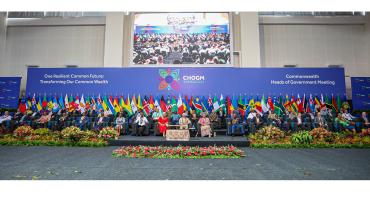Acute challenges faced by LGBTI+ people must be addressed as part of an inclusive approach to tackling the Covid-19 pandemic.

Acute challenges faced by LGBTI+ people must be addressed as part of an inclusive approach to tackling the Covid-19 pandemic.
Human rights and development experts made this call during a Commonwealth event commemorating International Day Against Homophobia, Biphobia and Transphobia (IDAHOT).
Karen McKenzie, head of human rights at the Commonwealth, said the pandemic has had a “disproportionate impact” on the LGBTI+ community.
She said the Commonwealth supports a multilateral approach, including on LGBTI+ equality and inclusion.
It will continue working with partners including governments, accredited organisations, United Nations organisations, civil society and national human rights institutions to ‘break the silence’, which was the theme for this year’s IDAHOT on 17 May.
These thoughts were echoed by Victor Madrigal-Borloz, UN independent expert on protection against violence and discrimination based on sexual orientation and gender identity.
He said there is not a level playing field for LGBTI+ people because “they are not only affected by pervasive levels of violence in their everyday lives but also they are disproportionately represented in the ranks of the poor and of persons experiencing homelessness, and they unfortunately have consistently lower outcomes for health.
“Therefore, they come in a situation of significant weakness to a pandemic that is impacting those particular sectors.”
He said their vulnerability was further compounded by stigma and he raised concern that Covid-19 is being “used as an excuse to persecute or attack LGBT and gender-diverse persons or as an instrument to withdraw rights they have gained.”
Phyll Opoku-Gyimah is the executive director of the Kaleidoscope Trust, which works to create positive change for LGBTI+ people and is also the co-ordinating member for the Commonwealth Equality Network.
She highlighted testimony from 34 member organisations covering 37 Commonwealth countries that shows clear themes.
“The pandemic we know has intensified the risk to LGBTI+ people - job losses, housing, food insecurity, physical and mental wellbeing and safety, the lack of access to health services and medication, and not forgetting access to justice,” she said.
There have been reports of police brutality against LGBTI+ people, she said, adding that home life does not always provide a safe haven: “LGBTI+ people are at risk of having to stay home in this lockdown with relatives who discriminate against them and stigmatise them, which puts a further burden on that threat to their mental health and physical health.”
Anton Ofield-Kerr, director of inclusive development group Equal International, stressed the importance of meeting the needs of all communities.
He said: “As has been shown in other infectious disease outbreaks, containment efforts that we've experienced in HIV, ebola and other epidemics is only as successful as the weakest link.
“Failure to contain an outbreak anywhere risks failure everywhere. And none of these infectious disease outbreaks occurred with anything like the speed scale and geography that we're seeing with Covid-19.”
He added: “Health facilities and systems that systematically stigmatise and exclude LGBT people, risk those individuals not seeking or receiving appropriate health care, and that is both a civil and human right, and risks further community spread and repeated outbreaks of Covid.”
The Commonwealth Secretary-General Patricia Scotland released a statement on IDAHOT that called for dignity and equality to be respected.
She said: “Only by working to make the societies in which we live truly inclusive will we make the international progress needed to build and deliver a common future.
“We must not be silent when human rights are violated, and must speak up boldly for those who cannot or dare not speak for themselves.”



